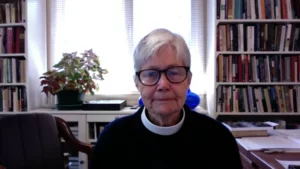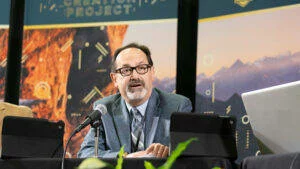 First, I agree I was a little loose in my language switching between “science” and “nature.” But I don’t want to accept a high wall of division between them, either. Science is the study of nature, and to the degree that we do good science, what science tells us is what nature tells us.
First, I agree I was a little loose in my language switching between “science” and “nature.” But I don’t want to accept a high wall of division between them, either. Science is the study of nature, and to the degree that we do good science, what science tells us is what nature tells us.
Clarifying the Two Books
To clarify my “two books” approach a little further, I can summarize with the table below:
| “Data” | “Theory” |
|
|
|
|
|
|
|
|
In both the realm of “special revelation” and “general revelation,” we are faced with experiences that come to us through our senses—in the case of special revelation, one-time, non-reproducible acts, visions, or words from God that are transmitted by witnesses to us; in the case of general revelation, experiences that are largely (but not always) reproducible. In both cases,In a sense, this two-books view challenges us to form a single meta-theory that encompasses both theology and scientific theory and makes sense of both sets of data. there is a shared set of experience available to all, which honesty demands we not alter, and a scholastic effort to make sense of it by general theories and frameworks, which we have altered through the ages, not on a whim, but as we find better ways to make sense of things. Scientific theories are not equal to the data of nature, and theology is not the same as Scripture, and we can go far wrong if we conflate the two, but well-done science and theology should not be lightly discarded, either, because each represents the efforts of thousands of very wise people to converge at a coherent understanding of the source material.
I would add that in the same way that we try to make our theology agree with the data of the Bible and our scientific theories agree with what we observe in nature, we should also allow cross-fertilization, to make our scientific theories agree with the Bible (which is not the same as making it agree with current theology) and our theology agree with nature (which is not the same as making it agree with current scientific theories). In a sense, this two-books view challenges us to form a single meta-theory that encompasses both theology and scientific theory and makes sense of both sets of data.
Non-Human Hominids?
On your second point, yes, I would put non-human hominids in the same category as animals. But that doesn’t mean that they were unthinking or uncreative. Rather, we already know that in the animal world there is creativity and thought, as anyone who has spent time with animals knows. This gets at the question of what we mean by the image of God. The Christian Scientific Society had a meeting on this a few years ago; Christians have differing views. I lean toward Jack Collins’s view that the image of God is both an appointed role and a gifting (physically, mentally, and spiritually) to perform that role. But people having the unique image of God does not mean they are utterly different from animals. It also does not rule out, in principle, the possibility of interbreeding with hominids without the image of God. Although this would presumably have been immoral, we know that people have tried just about everything sexually possible, immoral or not, and we can interbreed related types of animals. But in general, yes, I would say that my read of the genetic science is that the commonalities are largely due to common design, and that there are also very significant genetic differences between humans and animals.
Carrying Tensions without Fear
On your last point, in general I don’t believe in “preemptive capitulation,” which is so common in science/faith dialogue, that is, trying to formulate a view that is impervious to any future possible change in science. So many of my colleagues in science/faith dialogue are frightened to death of any apologetic or theological argument based on science, because science might change. Why so afraid? Science makes revisions all the time based on new data, without crumbling, and so can theology—but there is no reason to preemptively worry about what imaginary new science might appear. After all, while new scientific arguments might emerge that an original pair is impossible, new arguments might arise after that, that it is possible! Why should I anticipate only the scientific change least favorable to my view?
Of course, it is not just those favorable to intelligent design who link their views to current science. Theistic evolutionists do also. In particular, they have wedded their viewpoint to Darwinian natural selection, right at the time when a good fraction of the biological world is looking for a “Third Way,” rejecting the notion that natural selection can do all that is advertised for it. Francis Collins,I find it fascinating to be in the business of trying to resolve tensions of all three types, a project longer than the lifespan of any one person. for example, put great weight on the broken vitamin-C gene in humans.Francis Collins, The Language of God: A Scientist Presents Evidence for Belief (New York: Free Press, 2006), 139. What would he and other theistic evolutionists do if a highly specific function were eventually found for that gene? Should he build his arguments in such a way as to anticipate that possibility?
In general, though, you are right that, contra Karl Popper, a single datum almost never overturns a successful paradigm. A striking example of this was reported recently: quartzite rocks on a volcanic island, which violate all prior predictions of the plate tectonic theory.See: https://blogs.ei.columbia.edu/2019/02/12/lost-continent/?fbclid=IwAR2XLlWtM1I9e5VRP7cHroK8qGK0YnK2cfQJ_dzdPExwhpkAmPmVUJJO_xo But the plate tectonic model is doing just fine, because it explains so many other things. In general, all of us carry various “tensions,” things that don’t make sense to us but don’t cause us to jettison our prevailing paradigm. I see tensions within theology (e.g., the origin of moral evil), tensions within science (e.g., the proper interpretation of quantum mechanics), and tensions between the two (e.g., the question of when Adam lived, discussed here). Sometimes such tensions get resolved by new thinking, and sometimes they persist for centuries. I find it fascinating to be in the business of trying to resolve tensions of all three types, a project longer than the lifespan of any one person.







Comments
Be the first one to make a comment!